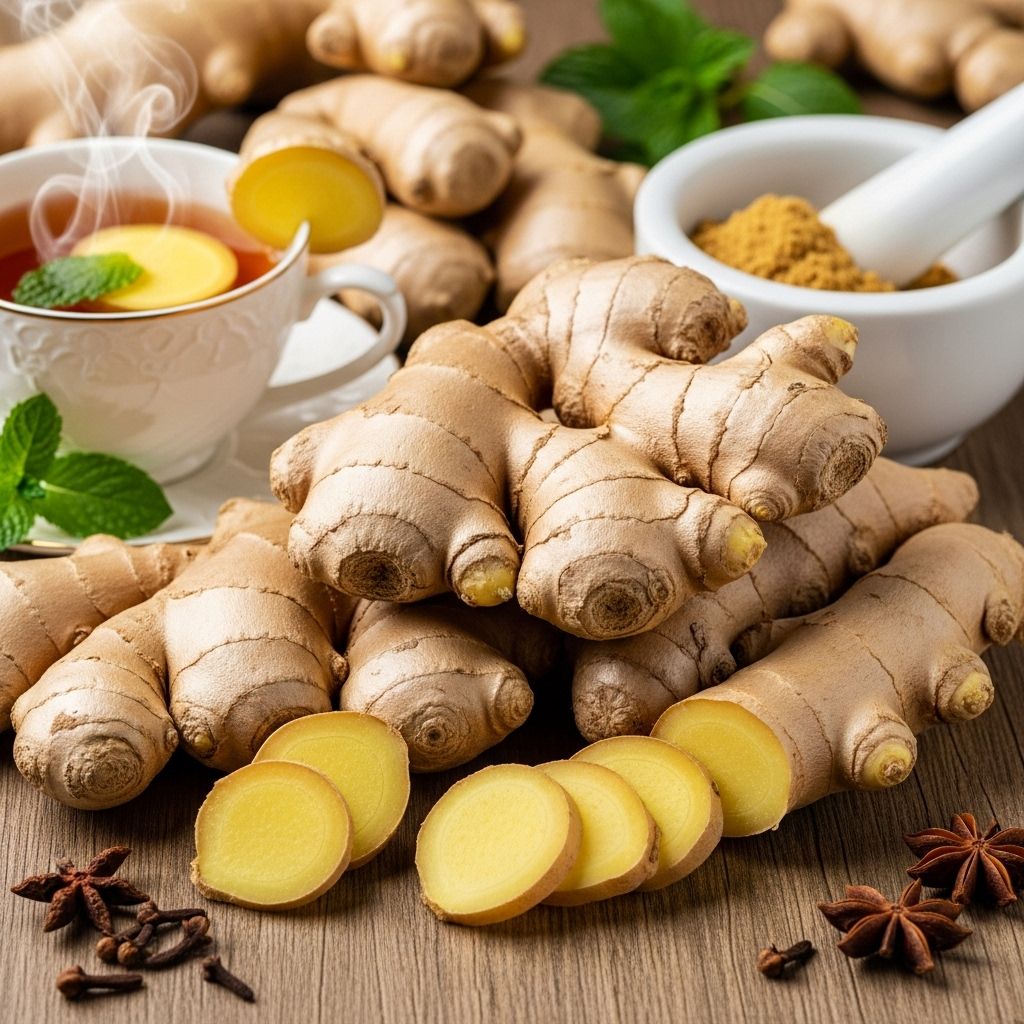The Comprehensive Benefits of Ginger: Health, Wellness, and Science
Explore how ginger supports immunity, reduces inflammation, aids digestion, and promotes heart health based on clinical research.

Ginger (Zingiber officinale) has been revered for centuries in traditional medicine and is now recognized by modern science for its broad spectrum of health benefits. This article explores the evidence-based advantages of ginger, reviewing its impact on inflammation, digestion, heart health, blood sugar regulation, immunity, and more.
Table of Contents
- Introduction: Origins & Overview
- Active Compounds in Ginger
- Anti-Inflammatory and Immune Benefits
- Digestive Health & Nausea Relief
- Metabolic and Cardiovascular Effects
- Ginger for Pain Relief
- Blood Sugar and Diabetes Management
- Antioxidant Effects and Cancer Prevention
- Safety, Dosage, and Considerations
- Frequently Asked Questions (FAQs)
Introduction: Origins & Overview
Ginger is a flowering plant native to Southeast Asia whose rhizome (underground stem) is widely used as a spice and herbal remedy. Originally found in ancient Ayurvedic, Chinese, and Greco-Roman traditions, ginger has been used for thousands of years to treat ailments ranging from common colds and digestive disturbances to arthritis and migraines. Current interest in ginger is driven by clinical evidence demonstrating real mechanisms behind its traditional uses .
Active Compounds in Ginger
The health effects of ginger are mainly due to its phytochemical content, especially:
- Gingerols – The primary pungent compounds responsible for most of ginger’s anti-inflammatory and antioxidant actions.
- Shogaols – Formed from gingerols during drying and responsible for increased potency in dried ginger.
- Paradols and Zingerone – Other components with recognized biological activity.
These compounds interact with a variety of biochemical pathways—providing ginger with its diverse therapeutic properties .
Anti-Inflammatory and Immune Benefits
Reduces Chronic Inflammation
Chronic, uncontrolled inflammation is a risk factor in many diseases, including arthritis, autoimmune diseases, asthma, and heart disease. Recent research using human clinical trials demonstrate that ginger can suppress key inflammatory processes:
- Inhibits Neutrophil Overactivation: Ginger intake in healthy individuals increases cAMP inside neutrophils, white blood cells that drive inflammation. This action suppresses the formation of neutrophil extracellular traps (NETs), thereby helping to regulate immune overactivity linked to autoimmune diseases such as lupus and rheumatoid arthritis .
- Reduces Pro-inflammatory Cytokines: Gingerols and shogaols reduce molecules like TNF-α and IL-1β that promote swelling and pain .
- Potential As Complementary Therapy: Especially in autoimmune/inflammatory conditions, ginger may provide synergistic support alongside standard treatments .
Autoimmune Disease Spotlight
In recent studies, short-term daily ginger supplementation made neutrophils more resistant to harmful pathways that trigger inflammation and clotting. Scientists suggest that ginger could become a valuable adjunct in conditions like:
- Lupus (SLE)
- Rheumatoid Arthritis
- Antiphospholipid Syndrome (APS)
- COVID-19-induced Inflammation
Research continues to explore these promising therapeutic avenues .
Digestive Health & Nausea Relief
Traditional Uses and Modern Evidence
Ginger is perhaps best known for soothing digestive upset. It has long been used for:
- Relieving Nausea and Vomiting: Ginger acts on serotonin receptors in the stomach and intestines, providing symptomatic relief in a variety of conditions, including:
- Pregnancy-related (morning sickness)
- Motion sickness
- Postoperative and chemotherapy-induced nausea (CINV)
- Alleviating Indigestion and Bloating: Ginger accelerates gastric emptying and helps food transit through the gastrointestinal tract, reducing discomfort.
Scientific Evidence for Antiemetic Effects
- In random controlled trials (RCTs), ginger consistently reduced both the frequency and severity of nausea episodes in pregnancy and CINV .
- Meta-analyses confirm that ginger is more effective than placebo for both nausea and vomiting, with minimal risk of side effects .
Metabolic and Cardiovascular Effects
Improvement in Lipid Profiles
High cholesterol and unhealthy lipid profiles contribute to atherosclerosis and heart disease. Recent studies have found that ginger supplementation may provide cardiovascular benefits:
- Lowers LDL (‘Bad’) Cholesterol: Multiple clinical trials found that regular ginger intake reduces LDL, total cholesterol, and triglycerides, while raising HDL (‘good’ cholesterol) levels .
- Reduces Atherosclerosis Risk: In both animal models and human trials, ginger consumption led to a significant reduction in the development of atherosclerotic plaques and less vascular inflammation .
- Promotes Healthier Blood Vessels: Evidence suggests ginger can stabilize plaques, reduce lipid peroxidation, and enhance overall vascular function .
| Parameter | Observed Effect |
|---|---|
| LDL Cholesterol | Significant Decrease |
| Total Cholesterol | Significant Decrease |
| Triglycerides | Significant Decrease |
| HDL Cholesterol | Slight Increase |
Ginger for Pain Relief
Ginger’s pain-relieving effects are well-supported in multiple clinical domains due to its ability to inhibit prostaglandin and leukotriene synthesis—compounds associated with pain and swelling:
- Dysmenorrhea (Menstrual Pain): Systematic reviews and RCTs confirm that ginger supplements significantly reduce menstrual discomfort and symptoms, sometimes rivaling prescription NSAIDs but with fewer gastrointestinal side effects .
- Osteoarthritis and Rheumatoid Arthritis: Ginger reduces joint pain and improves mobility, likely due to its anti-inflammatory properties .
- Headaches and Migraines: Some early evidence suggests ginger may be beneficial for reducing migraine severity, though more research is needed.
Blood Sugar and Diabetes Management
Type 2 diabetes is marked by high blood sugar, poor insulin sensitivity, and systemic inflammation. Multiple clinical studies and meta-analyses show that ginger can help regulate glucose metabolism:
- Lowers Fasting Blood Sugar: Ginger supplementation in diabetic populations significantly lowered fasting glucose and improved overall glycemic balance .
- Improves Insulin Sensitivity: Subjects taking ginger demonstrated improved insulin function and reduced insulin resistance (measured by HOMA-IR scores) .
- Reduces Glycated Hemoglobin (HbA1c): Long-term studies found statistically significant declines in HbA1c, a marker of chronic blood sugar control .
Antioxidant Effects and Cancer Prevention
Oxidative stress is a key factor not only in aging but in the development of chronic diseases, including cancer. Ginger’s phytochemicals actively scavenge free radicals and enhance the body’s intrinsic antioxidant defenses:
- Enhances Antioxidant Enzyme Activity: Increases levels of enzymes such as superoxide dismutase (SOD) and catalase.
- Protection Against DNA Damage: Early laboratory studies indicate ginger extracts can protect cells against genotoxicity (damage to genetic material) .
- Anticancer Potential: Preliminary research suggests ginger may interfere with cancer cell signaling and proliferation, particularly in digestive tract cancers. However, robust clinical studies are still limited .
Safety, Dosage, and Considerations
Ginger is generally recognized as safe when used in culinary amounts or as a dietary supplement. Most people can tolerate 1–3 grams of ginger powder per day (or equivalent forms) without side effects. However, some considerations include:
- Mild Side Effects: High doses may cause minor heartburn, stomach upset, or diarrhea.
- Precautions: Individuals on blood thinners (like warfarin), with gallbladder disease, or who are pregnant should consult healthcare providers before using large amounts.
- Supplement Formulations: Ginger is available as fresh or dried root, powder, tea, capsules, and extracts. Bioactive content varies, so standardized supplements offer greater dosage consistency.
Practical Uses and Recommendations
To harness ginger’s health benefits, individuals can:
- Add freshly grated ginger to teas, soups, stir-fries, or smoothies.
- Use dried ginger spice in baking, oatmeal, or curries.
- Select capsules or extracts for standardized doses as suggested by a healthcare provider.
- Consider ginger chews or lozenges for travel or pregnancy-related nausea (with professional guidance).
Summary Table: Health Benefits of Ginger
| Health Domain | Main Benefits |
|---|---|
| Inflammation & Immunity | Reduces chronic inflammation, beneficial for autoimmune diseases |
| Digestive System | Relieves nausea, improves indigestion, acts as antiemetic |
| Cardiovascular Health | Lowers LDL/triglycerides, reduces atherosclerosis risk |
| Pain Management | Reduces joint, menstrual, and migraine pain |
| Blood Sugar Control | Lowers fasting glucose, improves insulin sensitivity |
| Antioxidant Action | Scavenges free radicals, potential anti-cancer properties |
Frequently Asked Questions (FAQs)
Q: How much ginger should I take for health benefits?
A: Most studies use doses of 1–3 grams of ginger powder daily (in capsules or divided doses). For nausea, as little as 1 gram may be effective. For cardiovascular and inflammatory benefits, 2–3 grams per day is typical. Always consult with a healthcare provider for individualized recommendations, especially if you are pregnant or taking medications.
Q: Can ginger supplements interact with medications?
A: Yes. Ginger may increase the risk of bleeding when combined with blood thinners (such as warfarin or aspirin). It may also interact with diabetes medications by lowering blood sugar. If you are taking prescription drugs, consult your doctor before starting regular ginger supplementation.
Q: Is ginger safe during pregnancy?
A: Ginger is commonly used for nausea during pregnancy and is generally considered safe in moderate food or supplement amounts (<2 grams per day). However, always consult with your healthcare provider before use during pregnancy.
Q: What is the best way to consume ginger for maximum benefits?
A: Fresh ginger and standardized extracts or capsules provide the most consistent active compound content. Incorporating ginger daily in food or beverage form is ideal for ongoing support. For targeted uses (e.g., anti-inflammatory effects), capsules or tablets with standardized gingerol content are preferred.
Q: Are there any people who should avoid ginger?
A: Individuals with bleeding disorders, those on anticoagulants, or those with gallbladder concerns should exercise caution. Always seek personalized medical advice if you have underlying health issues.
References
- https://news.cuanschutz.edu/news-stories/new-research-adds-evidence-to-the-benefits-of-ginger-supplements-for-treating-autoimmune-diseases
- https://www.ncbi.nlm.nih.gov/books/NBK92775/
- https://pmc.ncbi.nlm.nih.gov/articles/PMC7019938/
- https://www.health.harvard.edu/staying-healthy/health-benefits-of-ginger-and-simple-ways-to-incorporate-this-zesty-root-into-your-diet
- https://www.medicalnewstoday.com/articles/265990
- https://health.clevelandclinic.org/ginger-health-benefits
- https://www.webmd.com/diet/ss/slideshow-health-benefits-ginger
Read full bio of medha deb












